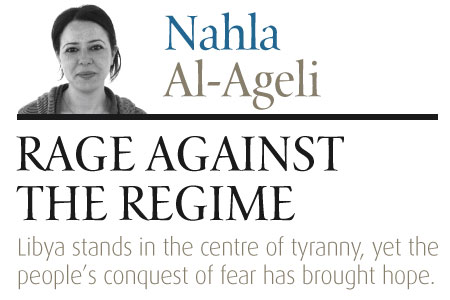
Rage Against the Regime
Issue 79 April 2011
Libya stands in the centre of tyranny, yet the people’s conquest of fear has brought hope.
I have lived abroad for over 27 years, but I have always been proud of my distinct Libyan cultural heritage. However, I have also been fully aware of the systematic terror techniques employed by Colonel Gaddafi to quell dissent. The beauty of the revolution begun on 17th February, ‘The Day of Rage’, was that Libyans finally managed to conquer their inner fears. Inspired by the Jasmine Revolution in Tunisia and Egypt’s Tahrir Square, the people rose up against the regime. After much injustice and psychological abuse, the human spirit had won through. But the battle for freedom in Libya is far from over.
Libya’s problems are similar to Egypt and Tunisia: a dictatorial regime, poverty and youth unemployment - Libya has an overall 30% unemployment rate. However, it also has some distinct qualities, particularly its tribes and clans. Gaddafi has used the diverse nature of Libya’s people to maintain control, and in the face of dissent, has threatened the country with civil war. Hosni Mubarak also threatened that Egypt would be thrown into turmoil if he was removed. Gaddafi however has gone to lengths that even Mubarak baulked at by turning his military onto the people, and by hiring foreign mercenaries to do his killing. Even though we have seen mounting defections, police and military brutality have left a bloody wake.
Gaddafi’s western-educated son, Saif ul Islam, has declared “the time has come for full-scale military action,” and it would seem that pro-government military forces are achieving some success in regaining control. As I write this, pro-democracy supporters are fleeing the oil port of Ras Lanuf after sustained attacks by forces loyal to Gaddafi. This will not help their cause, but may improve the share price of companies such as Italian energy group ENI, which says it will only reach its yearly profit growth target if normal production resumes in Libya.
ENI, which is 30% owned by the Italian government, is an example of the complex web of international interests that are at play. Libya produces less than two percent of the world’s oil, but the high quality of its product magnifies its importance in world markets. Libya has ‘sweet’ crude oil, which cannot be easily replaced in the European and Asian refineries that are not equipped to refine high sulphur ‘sour’ crude. The sweetness of Libya’s crude, and its geo-political significance, has attracted many to its lands, including Tony Blair. His visit in 2004 was followed by some very lucrative contracts for British oil companies. Today however, Britain does not seem to know which way to turn with regards to Libya. Abhorrence at Gaddafi’s brutality against his people does not yet appear to be enough to stimulate action. France became the first country to recognise the Libyan rebel leadership, the National Libyan Council, as the country’s legitimate government, but who knows what game she is playing, as Libya unravels into greater chaos.
One thing is for sure, the tools of smart phones with cameras linked to social networks like Facebook and Twitter mean that the world is watching the regime’s crimes as they unfold, and the international community cannot just sit back and do nothing. There is little space for the evidence of brutality to be hidden. Even so, I am in receipt of reports from Tripoli, where the bodies of the dead have been disposed of by security forces, presumably so that nobody can ever know the full human cost of this revolution.
As a dual national, I would love to see the UK help in the Libyans’ struggle. Britain should be imposing a no-fly zone, revoking Gaddafi’s legitimacy at the international table, and aiding the International Criminal Court in the capture and arrest of Gaddafi and his aides. Furthermore, the wealth of the nation should be returned to its rightful heirs - the people of Libya. They have been deprived of the oil riches which are rightly theirs, and have endured corruption and impoverishment.
If the people of Libya manage to topple Gaddafi, there will be the need to start from scratch to create a new system that works for every Libyan’s dignity and prosperity. It will take years to undo all the damage that has been wrought on this nation and its people, not just physically, but emotionally. Truly, it will be an uphill struggle but I have every confidence that I will soon be able return to a different and better Libya.
Nahla Al-Ageli, guest comment writer, and a freelance journalist.
Bookmark this |
|
Add to DIGG |
|
Add to del.icio.us |
|
Stumble this |
|
Share on Facebook |
|
Share this |
|
Send to a Friend |
|
Link to this |
|
Printer Friendly |
|
Print in plain text |
|


Comments
0 Comments